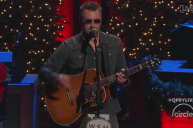During Ashley McBryde's Grand Ole Opry induction on Saturday, Dec. 10, Eric Church took to the stage to sing a vulnerable, unreleased song. After joining McBryde to perform "Bible and a .44," which is an emotional ode to her grandfather, Church introduced fans to the brand new tune, dedicated to fathers.
Videos by Wide Open Country
"In keeping with the theme of the night, a song I sang with Ashley about her grandfather, I want to play you a new song nobody's heard," Church told the crowd from the legendary Opry stage.
Armed with his acoustic guitar and signature aviator glasses, he dove into the song, which details all the traits someone may have — good or bad — because they take after their father. In the song, these traits include wearing "jeans and boots," drinking "not-lite beer" and listening to Merle Haggard, among other characteristics.
"When I'm dealing cards / always keep one hid / I like to buy used cars 'cause my dad did," he sings in the first verse.
Church sang the lyrics with sincerity -- as if he were singing from experience -- so it may surprise fans to learn that he didn't write the song. The tune came about through a rare co-write between Jessi Alexander, Jon Randall and Jack Ingram in October 2019. In an exclusive interview with Wide Open Country, Alexander reveals that Ingram brought the idea to the writing room, but they each pulled from their personal relationships with their fathers to write the poignant song.
"When I got there, they had a couple of lines going, if not maybe a verse," Alexander shares. "I know that the 'used car' line is special to [Ingram]. I feel like we all drew different parts of our dads. It all definitely came from a deep well of visual places, emotional places. My dad's a recovering alcoholic, so I definitely had some of that angst as far as where I was coming from."

Photo by Jason Kempin/Getty Images
Although the tune relates strongly to those who can recognize pieces of their father in themselves, the song's message doesn't stop there. Alexander and Randall, who were married in 2007, share three children together, and she says she can see the message of the song at work when she watches the way her two sons take after their dad.
"Now that I have sons, it's just so funny to watch them look up to their dad," she says. "They might play the same guitar because JR played it, and that's all he had around the house. The way JR treats me will be the way they saw him. It's just so fascinating how it trickles down."
As the song continues, Church also mentions the not-so-positive characteristics one could glean from their father. One verse extends the message of the song to encompass the imperfections that could be brought to a relationship due to what was learned from a father figure.
"Don't want to roll downhill / Don't want to fly too high / Don't want to break your heart / Babe, I don't want to make you cry / Don't want to say things that I'll regret / But I know I will 'cause my dad did," he sings towards the end of the song.
Alexander says these imperfections were important to include in the song, as they offer a realistic view into how dads can affect every aspect of their children's lives.
"Your dad is such a prominent figure and such a north star, good or bad," she says. "You're gonna do it the way he did it because that's what you saw. There are definitely chain breakers out there, but most people do it the way they saw it done."
Overall, the song serves as a heartfelt tribute to the ways a father can influence one's life, and the final line drives this message home in a moving way.
"I can see him now when I look in my mirror," Church sings.

Photo by Jason Kempin/Getty Images for BMI
Church has not yet revealed plans to officially release the song, but Alexander says the singer has been enthusiastic about it since the moment he heard it.
"I think [Ingram] just sent it to him and just said something like, 'Hey, this is something I'm digging. I think you would dig it too,'" Alexander says. "And literally, within hours, he's getting not only texts from Eric saying, 'Oh my God, I love this,' but Eric has already learned it, he's playing it on guitar, voice memo-ing it and sending it back."
"For a songwriter that does this job day in and day out, there's not much better instant gratification than a pitch, then the 'Love it,' and then they're already singing it," she adds. "That is so fulfilling."




